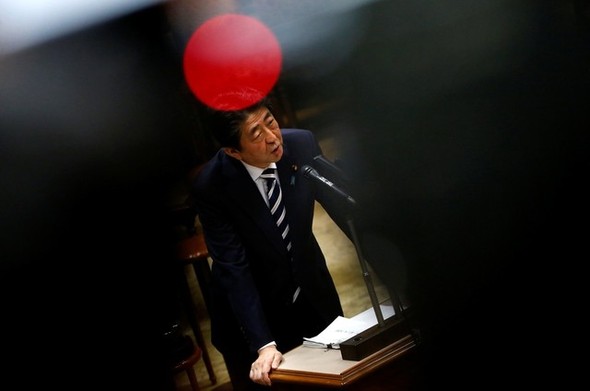 |
|
Japanese Prime Minister Shinzo Abe responds to allegations regarding forged documents related to the Moritomo Gakuen scandal at the Diet in Tokyo on Mar. 19. (Reuters)
|
A summit would be the first since 2004 and likely include discussion about Japanese abductees
The Japanese government sent messages to Pyongyang over various channels expressing Prime Minister Shinzo Abe’s desire to have a summit with North Korean leader Kim Jong-un, the Kyodo news agency reported on Mar. 21. Tokyo cited the Pyongyang Declaration – a plan for normalized diplomatic relations and economic cooperation agreed upon by North Korea and Japan during a Sept. 2002 North Korea visit by then-Japanese Prime Minister Junichiro Koizumi – in inquiring about the need for a summit, Kyodo reported. The message called on Pyongyang to agree to a summit to discuss implementation of the declaration as a matter in North Korea’s own interest. The Japanese government also proposed discussing the issues of abducted Japanese nationals and North Korea’s nuclear and missile development programs. Abe previously referenced the Pyongyang Declaration in a Mar. 16 telephone conversation with South Korean President Moon Jae-in, saying he looked forward to upcoming inter-Korean and North Korea-US summits leading to dialogue between North Korea and Japan. The proposal of dialogue from Tokyo – which has previously stressed the importance of pressure on Pyongyang – is seen as reflecting fears that with the inter-Korean and North Korea-US summits scheduled for April and May, the abductee issue, which is a matter of considerable importance domestically, may end up falling through the cracks. The message from Japan is that leaders from both sides should meet directly to discuss the abductee issue rather than calling on South Korea or the US to mediate a resolution. With its past emphasis on cooperating with South Korea and the US individually and together in responding to the North Korean nuclear issue, another factor in the summit proposal appears to be its isolation as both Seoul and Washington prepare for dialogue with Pyongyang. Abe views US cooperation as crucial for a North Korea-Japan summit to happen and plans to request it during his US visit and summit with US President Donald Trump scheduled for mid-April. But with Japan’s past calls for pressure on Pyongyang, it remains uncertain whether North Korea will agree to dialogue. Common ground will be particularly difficult to find on the abductee issue, with Japan demanding the repatriation of all abductees while North Korea insists that the matter has “already been resolved.” Abe may also face charges of inconsistency after previously maintaining that “dialogue for the sake of dialogue is meaningless” and insisting that he would “not agree to dialogue for dialogue’s sake.” During a brief conversation with North Korean Supreme People’s Assembly Presidium president Kim Yong-nam while visiting South Korea on Feb. 9 to attend the Pyeongchang Winter Olympics opening ceremony, Abe stressed that Tokyo remained unchanged in its intent to resolve the abductee, nuclear weapon, and missile issues and achieve normalization of relations based on the Pyongyang Declaration. A source knowledgeable on North Korea-Japan relations said Kim did not dispute the need for normalized relations and stressed the importance of “dealing with the legacy of the past” as Pyongyang had demanded in the past. “The reference to normalizing relations was akin to an expression of willingness to hold a summit,” the source said. “The North Koreans saw it that way as well, and [Japan’s hopes for a summit with North Korea] were reported to Kim Jong-un,” the source added. In meetings with US Vice President Mike Pence and South Korean Foreign Minister Kang Kyung-wha while visiting the US in mid-March, Japanese Foreign Minister Taro Kono requested that Tokyo’s desire for a summit be communicated to Pyongyang. Another foreign affairs source said the Abe administration’s position was also explained to North Korea during a visit last month by Mongolian Foreign Minister Damdin Tsogtbaatar, who has his own independent channel with Pyongyang. If a North Korea-Japan summit is held, it will be the first since Koizumi’s meeting with Kim Jong-il during his second North Korea visit in May 2004. By Cho Ki-weon, Tokyo correspondent Please direct questions or comments to [english@hani.co.kr]






